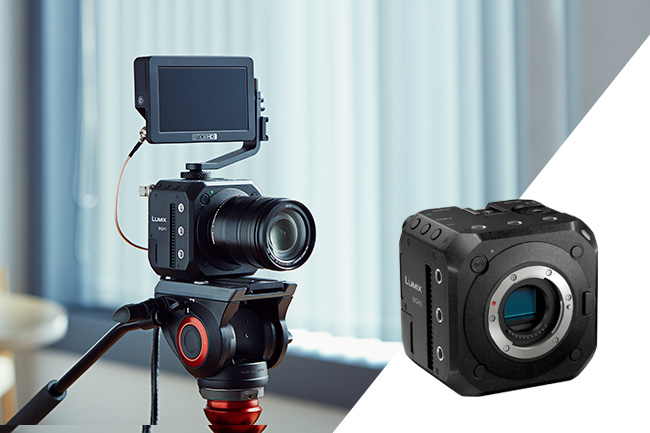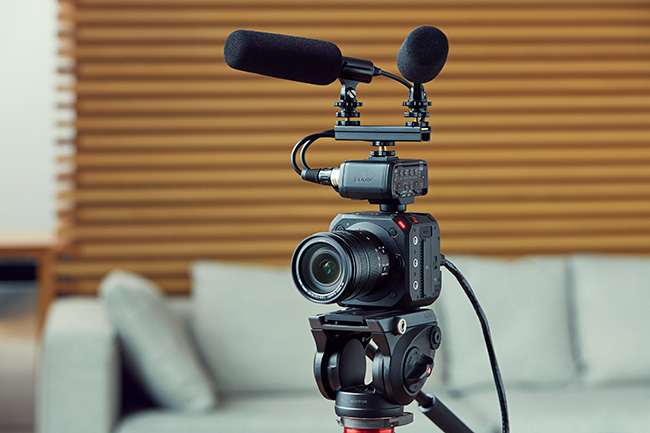Panasonic is proud to announce the release of its first box-style cinema camera, the LUMIX BGH1 Digital Single Lens Mirrorless Camera.

The BGH1 offers professional moviemakers and documentary cinematographers/videographers a professional cinema camera in a small cube form factor that is easy to install in a wide range of scenarios. It supports tight shots requiring a camera that can fit into a limited space, the connection of additional peripherals for camera control, and has fittings to attach accessories such as cages, gimbals and handles.
Supporting today’s flourishing streaming and broadcast opportunities, the compact, lightweight LUMIX BGH1 has high expandability with multi-camera control of up to 12 units. Its versatile operation includes shooting mounted on drones, IP remote control, direct live streaming and more.
James Choi, Product Marketing Manager, Imaging, Panasonic, explained: “This new box cinema camera boasts the class-leading video that Panasonic has built its reputation on with products like the flagship LUMIX GH5S. The BGH1 is ideal for filmmakers who require a compact body that they can easily deploy and control in an array of situations – capabilities that can’t always be met with traditional camera bodies.”
Using the Micro Four Thirds System mount, the new LUMIX BGH1 takes advantage of high mobility, an extensive interchangeable lens lineup, and Panasonic’s history of expertise in the development of professional cinema cameras, camcorders and the renowned LUMIX GH Series.
Key features
High user convenience for film production and scalability with external devices

The BGH1 has a new heat dispersion structure designed to achieve unlimited video recording. The durable, lightweight body is composed of aluminum and magnesium alloy, and the camera weighs just 545 grams.
The BGH1 complies with Power over Ethernet (PoE+), which allows the camera to be operated and powered using a single Ethernet cable through compatible peripherals. Control over a maximum of 12 BGH1 cameras[i] will be available using Panasonic PC software LUMIX Tether for Multicam[ii]. A future firmware update will support wired IP streaming (RTP/RTSP).
Terminals include USB 3.1 Type-C; plus 3G-SDI and HDMI Type-A which can be used for simultaneous output. GenLock IN and Time Code IN/OUT functions enable multi-angle synchronised video recording and support a scalable system with third-party external monitors, rigs and gimbals – making the camera ideal for virtual reality video, bullet time and homography. The BGH1 is equipped with two SD Card slots for backup or relay recording.
Professional-level video quality

The BGH1 integrates a 10.2-megapixel Live MOS Sensor with Dual Native ISO technology and Panasonic’s Venus Engine. The sensor can leverage a dual-base ISO setting, resulting in minimised noise and outstanding image quality from low to high sensitivity. This feature teams up with the Venus Engine processor to deliver a maximum ISO of up to 51200.
The BGH1 enables 4:2:0 10-bit C4K/4K 60p / 50p internal video recording as well as C4K/4K 4:2:2 10-bit output over HDMI. The camera records video with a designated gamma curve compatible with ITU-R BT.2100, and Hybrid Log Gamma is available with a low-bit-rate recording mode C4K/4K HEVC /H.265. The camera is pre-installed with V-Log L gamma profile, offering a wide dynamic range of 13 stops.
Variable Frame Rate lets users record overcranked/undercranked video in C4K/4K (60 frames per second, maximum 2.5x slower in 24p) and FHD (240 fps, maximum 10x slower in 24p[iii]). The minimum frame rate for quick motion video is 2 fps.
The camera also incorporates an improved Deep Learning autofocus algorithm that offers greater accuracy in detecting specific subjects – including humans, people’s faces, and fast-moving animals. In addition to the eye, face and body, the head is also separately recognised by real-time detection technology to provide even more precise focusing. The camera keeps tracking subjects when they move quickly, turn away, tilt their head or move far away from the camera.
Other practical features
- Supporting anamorphic lens (4:3)
- Tally lamps (front 1 and rear 1)
- Φ3.5mm microphone and headphone jacks
- Compatible with XLR microphone DMW-XLR1 (sold separately)
- φ2.5mm remote control input
- 4GHz Wi-Fi connectivity and Bluetooth 4.2 (BLE)
- Bundled accessories including a Cable lock band, AC adapter and AC cable
- Remote camera control using application software (LUMIX Tether for Multicam[iv] and LUMIX Sync)
- Tethered photo shooting with LUMIX Tether for Multicam software
- A SDK[v] (Software Development Kit) for camera control via USB will be provided free.
LUMIX BGH1 Australian Pricing and Availability
The BGH1 is priced at $3099 RRP[vi], and will be available in late November 2020 from leading photographic specialists.
For further information, please visit www.panasonic.com.au or call 132 600.
[i] Operation may be unstable depending on the connection environment and performance of the connected PC.
[ii] LUMIX Tether for Multicam will be released when the BGH1 goes on sale.
[iii] The angle of view is reduced when the frame rate is set to 201 fps.
[iv] LUMIX Tether for Multicam will be released when the BGH1 goes on sale.
[v] The SDK will be released for compatible LUMIX cameras (BGH1, S1, S1R, S1H, S5, GH5S, GH5, G9) at the following site https://panasonic.jp/support/global/cs/soft/tool/sdk.html on 14 October, 2020.
[vi] Battery not included. An optional Panasonic AG-VBR59 battery is required to be purchased to operate the camera when not using the supplied AC Adaptor or an optional compatible Ethernet cable.
